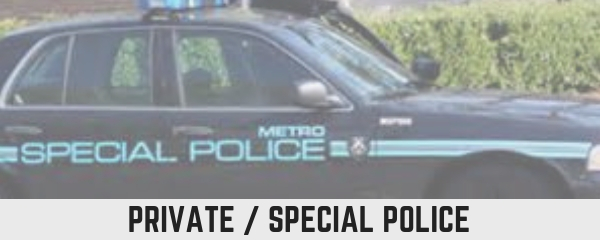
Career Diploma and Certification
Private and special police and private security personnel with special police commissions or statutory police authority are steadily gaining footing in law enforcement as more than 28 states now have some form of private policing. While most of these states do offer a basic required training course, none provide an advanced level of law enforcement training based on skill, knowledge or proficiency leading to officer safety and legal liability issues.
The Private Police Program is an advanced secondary education course for personnel who are either sworn, commissioned or have statutory powers of arrest. This course does not take the place of required state training but enhances the officer’s ability to perform at a higher level with a deeper knowledge and understanding of current laws, procedures, officer safety considerations and liabilities as well as 9 areas of frequent interaction, dangers and risks.
Topics Covered Include:
- Scope of Authority
- Legal standing, case law and liability issues of private police
- Extended arrest and search topics
- Extended legal authority
- Enforcement of civil rules-laws and documents
- Extensive Use of Force
- Use of technology to enhance safety & documentation
- Pursuits
- Tactical Awareness and Response
- Active Shooter
- Preparing Cases-Testifying in court
Who should enroll:
- Private or special police officers
- Security officers, who detain, apprehend or make citizen arrests
- Loss prevention and mall security officers
- Parking enforcement officers
- Campus public safety officers
- Any officer who is commissioned
- Officers with authority to issue parking or moving citations
- Armed or unarmed security officers
This course is designed to help the student to be a better officer in a safe and informed manner.
Typical Tasks
Specific tasks typically required of a Special/Private police officer is the same as any municipal, county or state law enforcement officer. Officers investigate crimes, issue traffic citations, enforce local and state laws, make arrests and testify in criminal and civil matters in court.
Potential Positions
Private or special police officers as defined by state statutes, are employed in both public and private agencies in about 28 states.
Employment Outlook
SPO positions have increased during the past 15 years and is expected to continue to do so.
Online/classroom
14 Week Online Course
Prerequisite: None
Program Length: As few as 6 Months
Payment Options Are Available